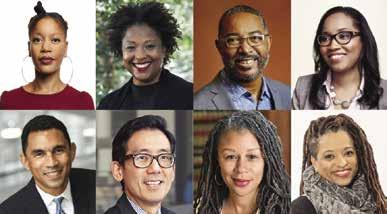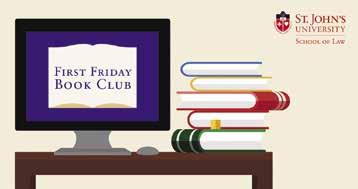
11 minute read
Faculty Focus
{ALLEN}
Professor Renee Nicole Allen’s article, “From Academic Freedom to Cancel Culture: Silencing Black Women in the Legal Academy,” will be published in the UCLA Law Review. Her book chapter, “Meet Xennials: The Bridge Between Generations,” published recently in Millennial Leadership in Law Schools: Essays on Disruption, Innovation, and the Future. Professor Allen was an invited speaker at Taking Our Space: Women of Color and Antiracism in Legal Academia, a roundtable hosted by Rutgers Law School.
{BARRETT}
Professor John Q. Barrett’s much-noted Oklahoma Law Review article, “Attribution Time: Cal Tinney’s 1937 Quip, ‘A Switch in Time’ll Save Nine,’” solves the mystery of who first said a “switch in time that saved nine” following President Roosevelt’s proposed court-packing law. Professor Barrett’s many virtual appearances this pandemic year include those at the Robert H. Jackson Center, the Museum of Jewish Heritage, Chautauqua Institution, the Holocaust Memorial & Toleration Center of Nassau County, the Federal Bar Association (EDNY), the Federal Bar Council (2d Cir.), the Illinois Holocaust Museum & Education Center, Washington University in St. Louis School of Law, Moscow’s Museum of the Great Patriotic War, the Nassau County Bar Association, the 92nd Street Y, and the Holocaust Memorial Center in Michigan. He also published a chapter in Hamilton and the Law, a new book about the celebrated Broadway musical, and a tribute essay, “RBG and the Girls,” in the New York State Bar Association Journal.
{BORGEN}
“Contested Territory,” a chapter that Professor Christopher J. Borgen wrote for the Oxford Handbook of the International Law of Global Security, examines the uses of international law in resolving territorial disputes. Professor Borgen also spoke about various aspects of law and military space operations at online conferences organized by the U.S. Naval War College and by the University of Nebraska College of Law and presented a work-in-progress, concerning law and the governance of activities in space, at an authors’ roundtable for a forthcoming book on law and diplomacy co-edited by Professor Peggy McGuinness. As chairperson of the Arms Control Committee of the American Branch of the International Law Association (ABILA), Professor Borgen organized and moderated a panel on the regulation of emerging weapons technologies at the ABILA’s International Law Weekend Online Conference.
{BOYLE}
Professor Robin Boyle was elected assistant editor-in-chief of Perspectives: Teaching Legal Research and Writing, an electronic journal published by Thomson Reuters. Her article, “Preventing Predatory Alienation by High-Control Groups: The Application of Human Trafficking Laws to Groups Popularly Known as ‘Cults,’ and Proposed Changes to Laws Regarding Federal Immigration, State Child Marriage, and Undue Influence,” will be published in a special edition of the peerreviewed International Journal of Coercion, Abuse, and Manipulation.
{CALABRESE}
Professor Gina Calabrese is serving as an Observer to the Uniform Law Commission’s Drafting Committee for a Uniform Law on Debt Collection Default Judgments, working to address the high percentage of consumer debt default judgments routinely entered against lower-income people in state courts. Her students in the Consumer Justice for the Elderly: Litigation Clinic have helped hundreds of people obtain relief when their money is wrongfully taken, or they can’t access credit or housing, due to default judgments against them. In her role as an Observer, Professor Calabrese provides input to the Drafting Committee drawn from her supervision of law students and from her experience in crafting legislative and public policy reforms. At the Practicing Law Institute’s 24th Annual Consumer Financial Services Institute, she presented Access to Justice as an Ethical Priority: Observations from the Consumer Debt Part, analyzing common practices of consumer debt courts under applicable standards of professional conduct.
{CAVANAGH}
“Foreign Discovery under 28 USC Sec. 1782,” a paper by Professor Edward D. Cavanagh, appears in the Federal Courts Law Review, a peer-reviewed journal published by the federal judiciary.
{DEGIROLAMI}
Professor Marc O. DeGirolami’s article, “Reconstructing Malice in the Law of Punitive Damages,” was accepted for publication by the peer-reviewed Journal of Tort Law. His paper, “Establishment’s Political Priority to Free Exercise,” is forthcoming in the Notre Dame Law Review.
{EVANS}
Professor Sheldon A. Evans’ article, “Interest-Based Incorporation: A Statutory Story of Federalism, Delegation, and Democratic Design,” was accepted for publication in the University of Pennsylvania Law Review. The paper continues his work exploring inefficiencies and moral dubiety when federal statutes incorporate state laws that have important policy implications across criminal law, immigration, property, and other areas. In “Pandora’s Loot Box,” forthcoming in the George Washington Law Review, Professor Evans expands on his interest in how emerging technology overlaps with criminal regulation in the underdeveloped legal study of virtual worlds. His earlier article, “Categorical Nonuniformity,” appears in the Columbia Law Review and was accepted for presentation at the prestigious Stanford/Harvard/Yale Junior Faculty Forum.
{GREENBERG}
“Adding Value to Justice Reform Conversations,” a paper by Professor Elayne E. Greenberg, appears in the ABA Dispute Resolution Magazine. Professor Greenberg teamed with her St. John’s Law colleague, Professor Cheryl L. Wade, on “How Will We Celebrate?” a Jurist opinion piece reimagining a more truthful narrative about American racism. Together with Noam Ebner, Professor Greenberg penned “Strengthening Online Dispute Resolution Justice” for the Washington University Journal of Law & Policy and “Designing Binge-worthy Course: Pandemic Pleasures and Covid-19 Consequences,” which appears in the Negotiation Journal. Her article, “Unshackling Plea Bargaining from Racial Bias,” was published in the Journal of Criminal Law & Criminology, while “Hey, Big Spender: Ethical Guidelines for Dispute Resolution Professionals When Parties are Backed by Third-Party Funders,” originally in the Arizona State Law Journal, was republished in the book Mandatory Disclosure Rules for Dispute Financing. Professor Greenberg’s follow-up article, “Please Ask, Please Tell: Disclosing Thirdparty Funding in Mediation,” appears in that same edition.
{KRISHNAKUMAR}
Professor Anita S. Krishnakumar presented her article, “Statutory History,” virtually at the University of Southern California School of Law and at a statutory interpretation theory seminar at Yale Law School. The article, which is forthcoming in the Virginia Law Review, explores the U.S. Supreme Court’s practice of examining prior versions of a statute— i.e., earlier drafts of the bill that ultimately became law or the original version of a statute that has since been amended—to speculate about a statute’s meaning.
{LAZARO}
Professor Christine Lazaro presented to the Oregon Bar Association Securities Regulation Section on the SEC’s Regulation Best Interest. She moderated a panel on Life Under Regulation Best Interest at the Public Investors Advocate Bar Association’s (PIABA) Annual Meeting. Her article, “An Overview of the Regulation Best Interest Rule Package,” was included in the panel program materials and later published in the PIABA Bar Journal. At the annual meeting of the Association of American Law Schools, Professor Lazaro presented on the panel Working in a New World—Employee and Worker Benefits Re-examined in a Time of Crisis and discussed a working paper that examines the regulation of IRAs, specifically when handled by securities brokers. She was also appointed recently to the Executive Committee for the AALS Section on Employee Benefits and Executive Compensation.
{MCGUINNESS}
Professor Peggy McGuinness is co-editing the Research Handbookon Law and Diplomacy with Georgetown Law Professor David Stewart. Out later this year, the book brings together leading scholars and practitioners to address the central theme of the interdependence of diplomacy and international law. Professor McGuinness’s essay, “Congressional Enforcement of International Human Rights,” was published by the Fordham International LawJournal, and her article, “Human Rights Reporting as Human Rights Governance,” appears in the Columbia Journal of Transnational Law. Professor McGuinness presented her paper, “The End of American Human Rights Exceptionalism,” at faculty workshops at Marquette Law School and the Drexel University Thomas R. Kline School of Law. She also coordinated this year’s Center for International and Comparative Law colloquium series, which brought leading scholars to campus virtually to discuss treaty interpretation, international human rights, and other timely topics related to international law.
{MONTANA}
Professor Patricia Montana’s article, “The Power of a Positive Tweet,” appears in the Journal of Legal Writing. Her paper, “Getting It Right by Writing it Wrong: Embracing Faulty Reasoning as a Teaching Tool,” co-authored with St. John’s Law Adjunct Professor Elyse Pepper, was accepted for publication in The Ohio Northern University Law Review.
{MOVSESIAN}
Professor Mark Movsesian chaired a panel on religious organizations as part of an online international conference on Law, Religion, and Coronavirus in the United States: A Six-Month Assessment co-sponsored by the law and religion centers at BYU, Emory, St. John’s, and Villanova Law Schools. He participated in web panels on the war in the Caucasus, sponsored by the Philos Project and by St. John’s University, and moderated a Federalist Society panel on the new Supreme Court term. Professor Movsesian also spoke at a virtual roundtable on comparative law and religion at Lomonosov Moscow State University’s Law Faculty. Along with Professor DeGirolami, he inaugurated the Center for Law and Religion’s Student Reading Society, which considered Antigone and Augustine’s City of God. Professor Movsesian’s article, “Severability in Statutes and Contracts,” was cited by U.S. Supreme Court Justice Neil Gorsuch in his concurring opinion in Barr v. American Association of Political Consultants.
{ROBERTS}
The Academic Advisory Board of the Getting Scholarship into Court Project named Professor Anna Roberts’ Fordham Law Review article, “Convictions as Guilt,” a ‘must-read.’ Professor Roberts presented her forthcoming work, “Victims, Right?” at Brooklyn Law School’s Faculty Workshop and at a Law and Society Association panel that she organized. Together with UConn School of Law Professor Julia Simon-Kerr, she designed a project to promote reform of the practice of prior conviction impeachment. They launched the project with a roundtable at the Law and Society Association’s annual conference. Professor Roberts has also been invited to present at a Brooklyn Law School conference on Rethinking the Role of the Victim in the Criminal Process.
{SALOMONE}
Professor Rosemary C. Salomone participated in a panel discussion on Minorities, Equality & Divided Societies as part of the Global Summit sponsored by the International Forum on the Future of Constitutionalism at the University of Texas School of Law. Her presentation on Transformative Constitutionalism: Education and Linguistic Rights in South Africa focused on the transformative vision of the South African Constitution and its role in three Constitutional Court rulings on language and race in South African society.
{SHEFF}
“Jefferson’s Taper,” Professor Jeremy Sheff’s article on the philosophical underpinnings of the patent and copyright system, appears in the S.M.U. Law Review. His Seton Hall Law Review essay, “I Choose, You Decide: Structural Tools for Supreme Court Legitimation,” was selected for inclusion in a special Supreme Court Appointments issue of the Cardozo Law Review. Professor Sheff will also have four different book chapters published on philosophical, theoretical, and doctrinal issues in intellectual property law: “Philosophical Approaches to Intellectual Property Law Scholarship,” in Approaches and Methodologies in Intellectual Property Research (Oxford University Press); “Misappropriation-Based Trademark Liability in Comparative Perspective,” in The Cambridge Handbook of International and Comparative Trademark Law (Cambridge University Press); “Finding Dilution,” in the Research Handbook on Trademark Law Reform(Edward Elgar Press), and “University Brands as Geographical Indications,” in Academic Brands: Privatizing, Quantifying, Reforming And Transforming The University(Cambridge University Press).
{SOVERN}
Professor Jeff Sovern published op-eds in the New York Daily News and at Bloomberg Law and was quoted in stories appearing in the Los Angeles Times and at Salon, Roll Call, and Bloomberg Law. The Consumer Financial Protection Bureau quoted from one of his co-authored articles and cited another one in its new debt collection rule. Professor Sovern presented his paper, “Six Scandals: Why We Need Consumer Protection Laws Instead of Just Markets,” at the Berkeley Consumer Law Scholars Conference.
{SUBOTNIK}
Professor Eva E. Subotnik’s forthcoming book chapter on visual art, copyright, and estates law has been accepted for the Second Annual Art Law Works-in-Progress Symposium.
{WADE}
St. John’s Law co-hosted a virtual event celebrating the publication of Professor Cheryl L. Wade’s book, Predatory Lending and the Destruction of the African-American Dream(Cambridge University Press). Co-authored with University of British Columbia Law Professor Janis Sarra, the book examines the racial wealth gap that’s widening with the continued economic exploitation of African Americans through targeted predation, including predatory lending in the home mortgage context. The authors conclude by offering structural, systemic changes to address predatory practices.
IP LAW IN FOCUS
Professors JEREMY SHEFF and EVA E. SUBOTNIK co-direct the Law School’s Intellectual Property Law Center, which presents its INTELLECTUAL PROPERTY COLLOQUIUM annually. Colloquium students explore doctrinal, theoretical, and policy issues and hone their critical and analytical skills through deep engagement with leading legal scholarship. This year’s Colloquium focused on the interaction of intellectual property law and issues of racial, gender, economic, and social justice.

SPOTLIGHT ON NEW SCHOLARSHIP
The Law School’s annual HON. EDWARD D. RE FACULTY WORKSHOP SERIES brings scholars from across the country together to discuss their current research and receive feedback on their works-in-progress from our faculty. Organized by Associate Dean for Faculty Scholarship EVA E. SUBOTNIK, this year’s workshop series featured scholarship related to race, racism, and antiracism across a host of domains. The presenters focused on racial justice and racial empowerment issues— particularly those most affecting, experienced by, or relevant to Black Americans.
FOR MORE
Visit our Faculty Scholarship Blog at stjlawfaculty.org.
READ ON
Facilitated by Professors CHERYL L. WADE and SHELDON A. EVANS, the monthly FIRST FRIDAY BOOK CLUB challenges preconceived notions and inspires newfound depth in understanding as participants discuss books by African American authors that explore some of the most impactful issues of our time.
This year’s Book Club selections, in order, were: • Ellis Cose, The Rage of a Privileged Class:
Why are Middle-Class Blacks Angry? Why
Should America Care? • Ta-Nehisi Coates, The Water Dancer • The Oxford Anthology of African-American Poetry (Arnold Rampersad & Hilary Herbold, eds.) • Chancellor Williams, Destruction of Black Civilization:
Great Issues of a Race From 4500 B.C. to 2000 A.D. • Isabel Wilkerson, Caste: The Origins of Our
Discontents • Janis Sarra & Cheryl L. Wade, Predatory Lending and the Destruction of the African-American Dream
Interested in joining the Book Club in the fall? Visit stjohns.edu/law/faculty/first-friday-book-club to learn more.










